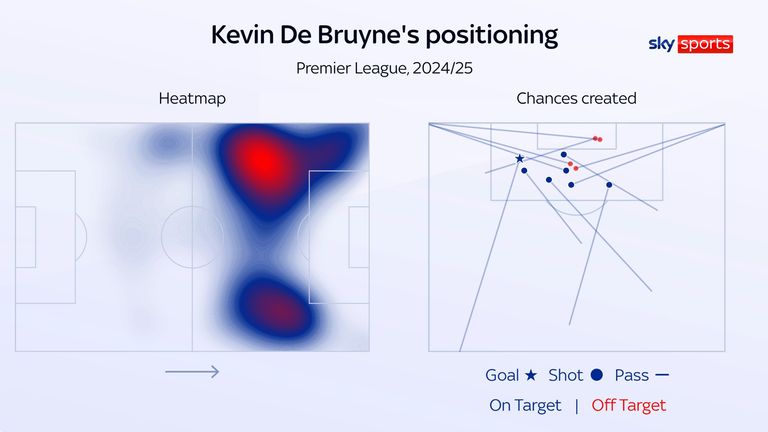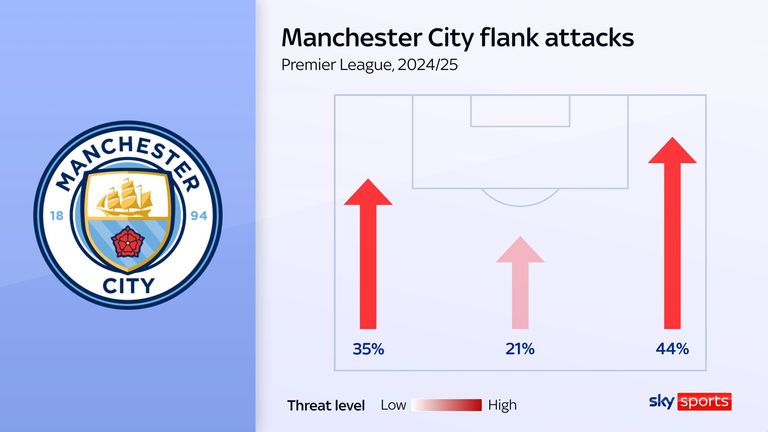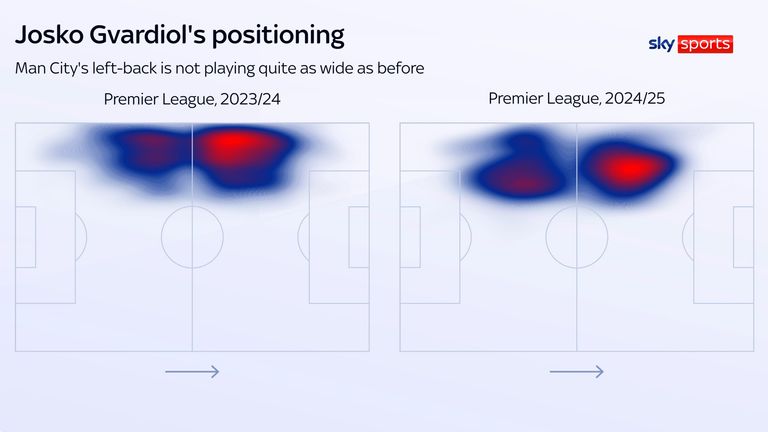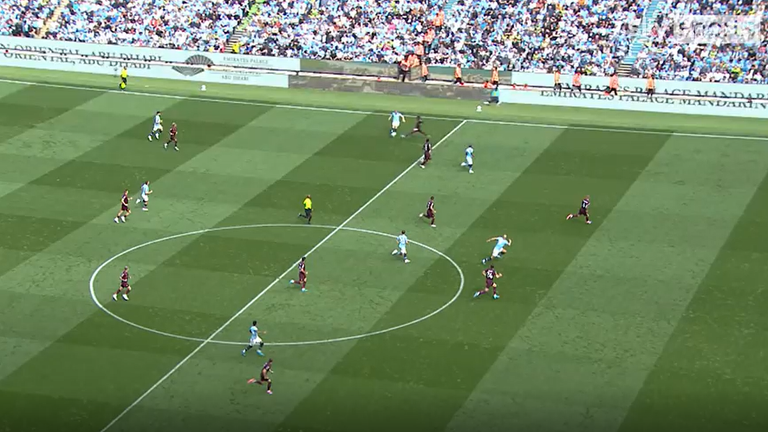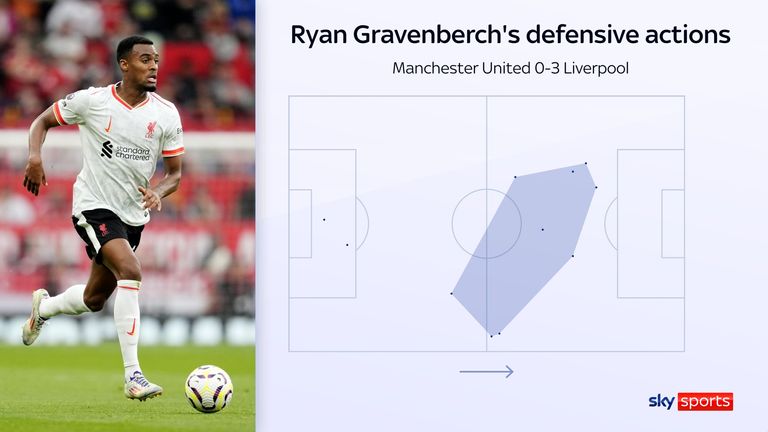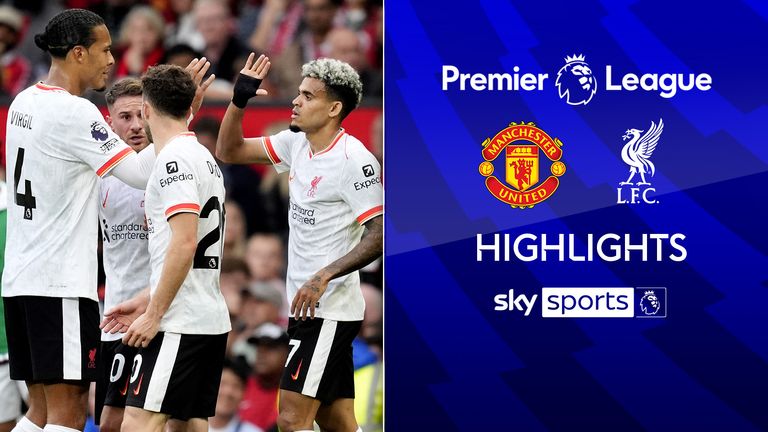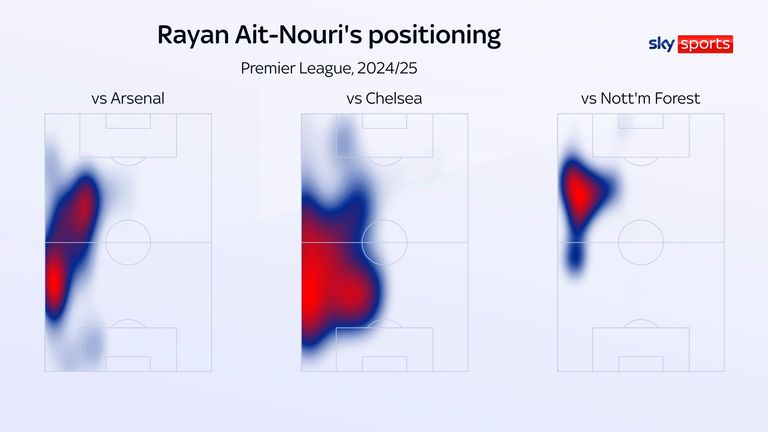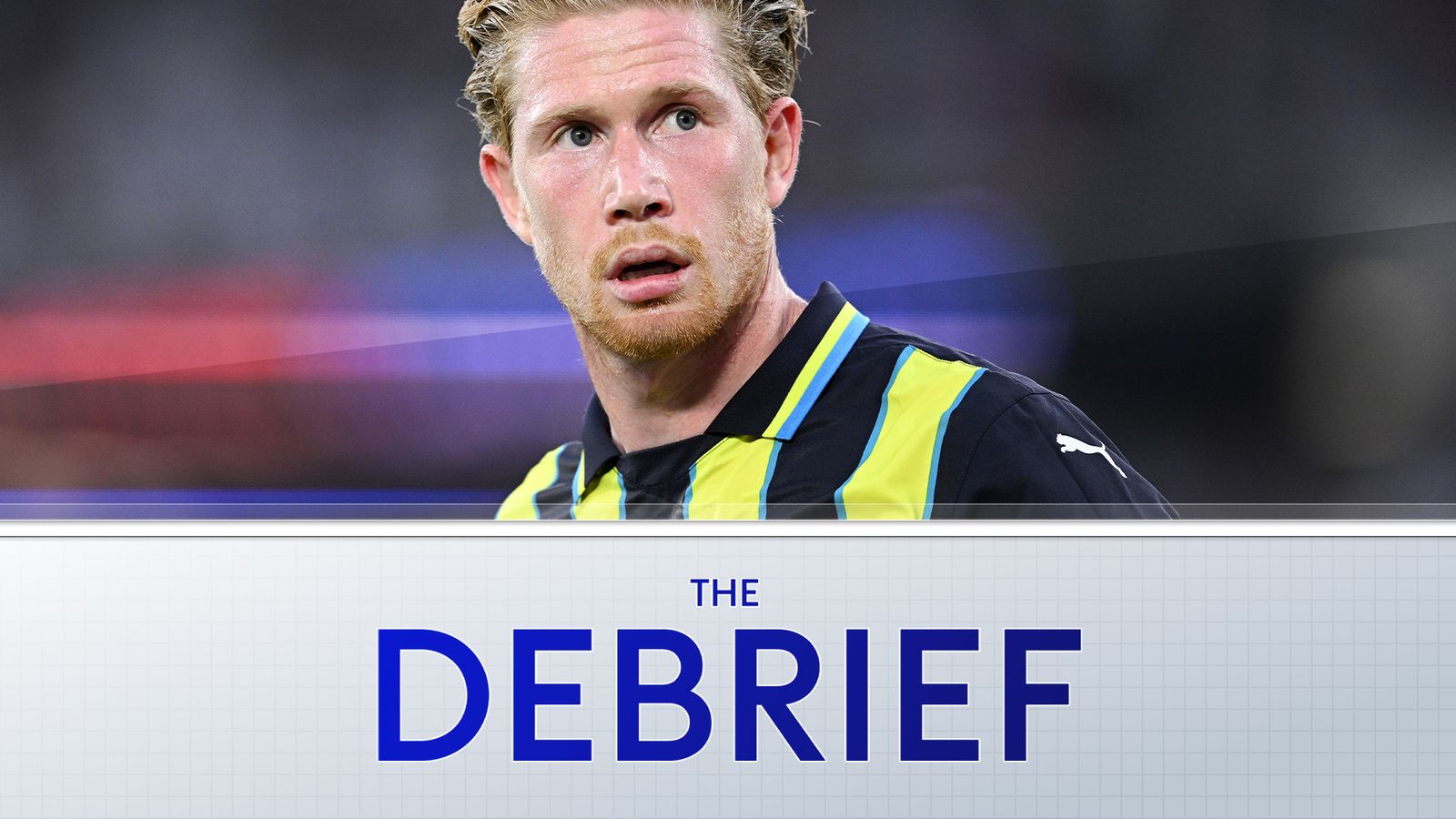
Erling Haaland’s hat-trick drew the headlines in Manchester City’s 3-1 win over West Ham on Saturday but one of the features of the champions’ control of the game was the link-up play between Kevin De Bruyne and Jack Grealish down the left flank.
De Bruyne has done some of his best work for City in that right half-space over the years but he has spent much of the start of this season in a wide-left role. The Belgian might be viewed as a No 10 but the last place Pep Guardiola seems to want him is central.
Instead, he is encouraged to drift wide in search of space – something City are doing much more this season, perhaps because those central areas are too crowded as teams increasingly look to block them off. The emphasis of City’s attacks highlights this.
Guardiola had tried to put bodies in the middle himself, often using Josko Gvardiol to provide the outlet from the left, but there has now been an adjustment. The Croatian left-back has begun to provide more of a supporting role inside so far this season.
Against West Ham, it was the much more creative presence of De Bruyne – and occasionally Bernardo Silva – offering the overlaps for Grealish. The result was that Aaron Wan-Bissaka endured a much more difficult day than in the FA Cup final in May.
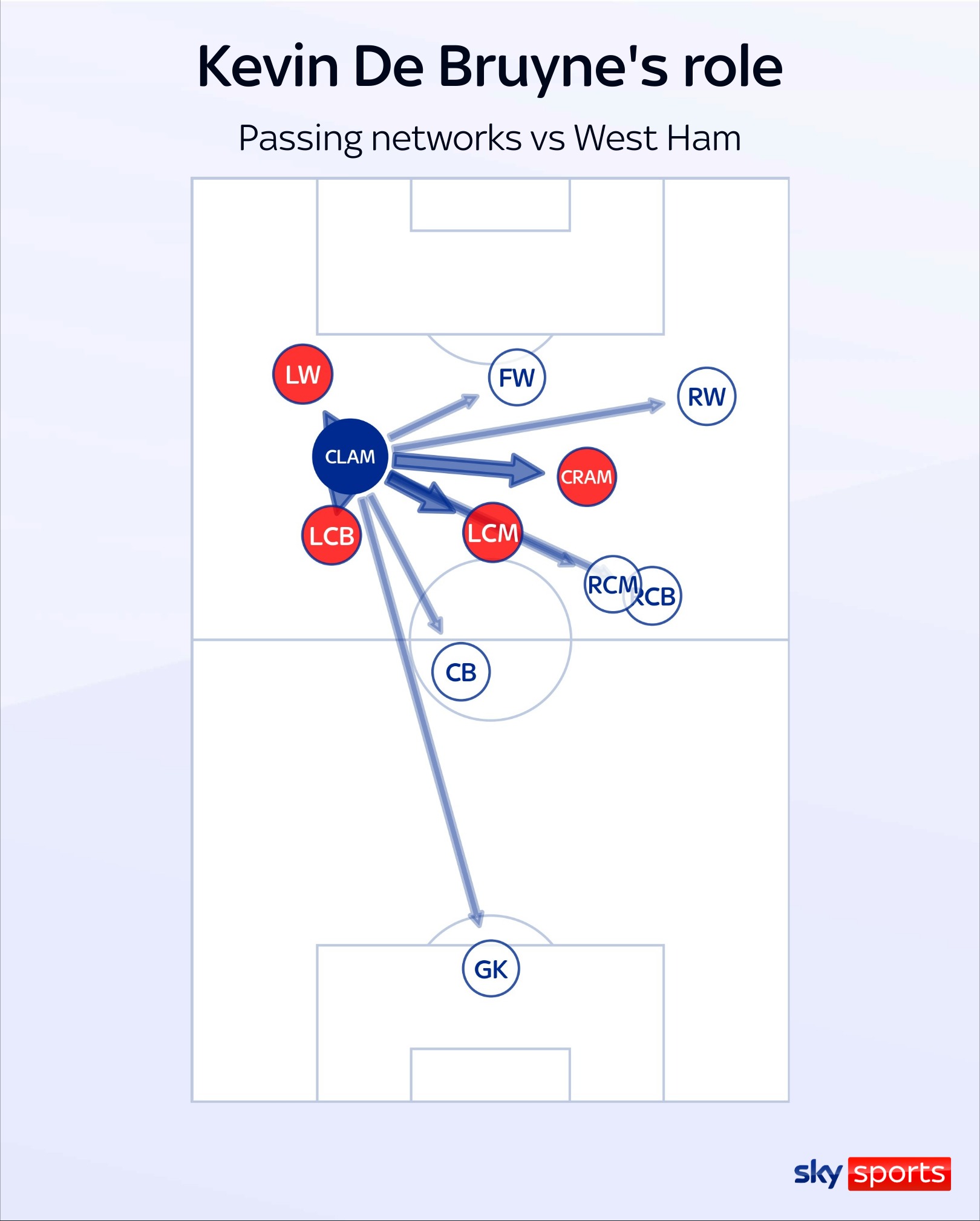
De Bruyne’s game is so complete that he is able to adapt to whatever is required. Instead of crosses curled in from the right, we have seen assists such as the angled ball from near the left touchline that set up Haaland to score in the 4-1 win over Ipswich.
His expected assists total this season is the highest of any Premier League player, they are just coming from a different area of the pitch. Guardiola knows De Bruyne can deliver from anywhere. His job is just to help his playmaker find where that space exists.
Gravenberch runs midfield for Liverpool
Erik ten Hag gave two former Bayern Munich players their full debuts for Manchester United on Sunday but it was Ryan Gravenberch, once of the German giants himself, who dominated as Liverpool won 3-0 at Old Trafford. Maybe this was the one ex-Ajax player he missed.
Gravenberch played a key role in the build-up to Trent Alexander-Arnold’s disallowed goal but was not denied for long – intercepting Casemiro’s poor pass to help set up Luis Diaz’s opener. It was one of four interceptions by Gravenberch during the match.
That is the most by a Liverpool midfielder in almost a year and indicative of the way he ate up the ground. Gravenberch has become the nominal defensive midfielder under Arne Slot, although most of his ‘defensive’ actions took place in the opposition half.
Nick Wright broke down his new role in The Radar prior to the game – highlighting the fact that Julian Nagelsmann and Thomas Tuchel had deployed him further forwards because of doubts over his defensive positioning. Even Slot admits Gravenberch has surprised him.
“Coming from the Netherlands we all know how good he is on the ball,” said the Liverpool head coach on Sunday. “He can be a really important player for our build-up game. But what impressed me most when I started working with him is how much he can run.”
Gravenberch covered over 11 kilometres against United, a number he hit for only the second time in his Liverpool career. In fact, all three of Liverpool’s starting midfielders passed that mark in this game. “They just kept on running,” said Slot.
It is fair to say Gravenberch’s first season at Liverpool never really got going as some had hoped and in that context the appetite for a new midfielder made sense. On this evidence, Slot may have discovered the player they needed was already here.
Dawson’s return sees Wolves tighten up
Much was made of the departures of Max Kilman and Pedro Neto in the aftermath of Wolves’ 6-2 defeat to Chelsea, but there was a significant change to Gary O’Neil’s structure in the opening two games that he corrected against Nottingham Forest.
That the main problem was tactical is highlighted by the fact eight of the team thrashed by Chelsea started last season’s win over Tottenham, one of Wolves’ best displays under O’Neil. It would have been nine had Nelson Semedo not been suspended.
One of the additional changes was enforced with Yerson Mosquera in for Kilman, but the other was interesting – Jorgen Strand Larsen in for Craig Dawson. A striker for a defender. It was an ambitious change that hinted at a desire for a more expansive style of play.
O’Neil’s comments before the 1-1 draw against Forest, indicated a rethink. “We had a plan for how the team would play but as the window progressed we missed players that would have helped us. I now have to be more adaptable with the style.” Time to revert.
Dawson returned at the City Ground in place of Hee-Chan Hwang and Wolves looked more assured again with the experienced centre-back impressing, just as he had done in helping his team to a clean sheet against Burnley in the Carabao Cup in midweek.
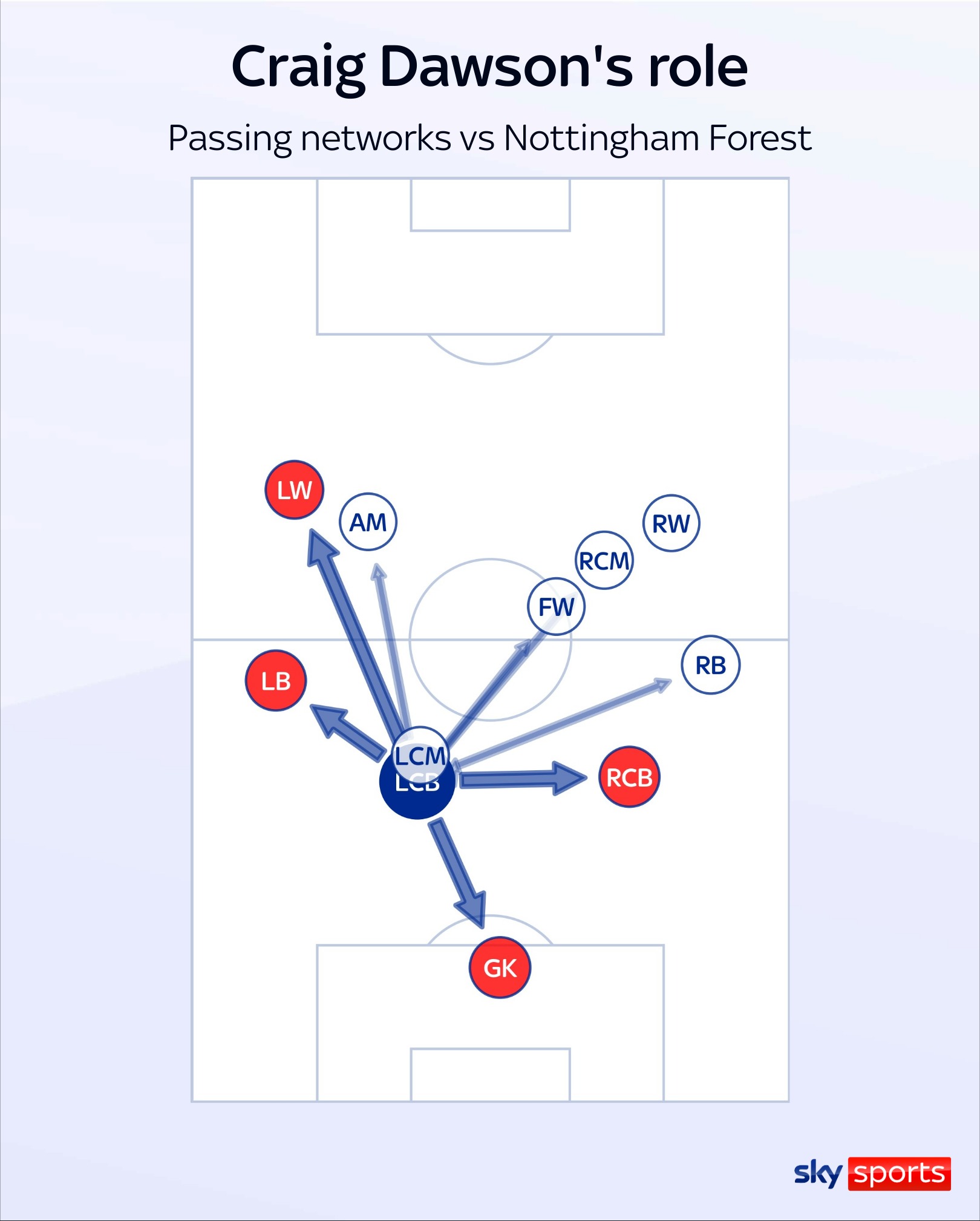
Against Forest, he made the most clearances of any player on the pitch, proving a ball magnet – having more touches, passes and even final-third entries than any other Wolves player. It was not just his own display but his impact on those around him.
Mosquera looked more comfortable to his right, Toti Gomes much improved to his left. Perhaps most significantly, the reshuffle allowed Rayan Ait-Nouri to move to the wing where he could do more damage to the opposition – and less to his own team’s hopes.
Ait-Nouri is arguably Wolves’ most talented player but struggled at left-back against Bukayo Saka and was tormented by Noni Madueke as the Chelsea player scored a hat-trick. “For the fourth and fifth goals, we had no left-back in place,” said O’Neil rather bluntly.
At Forest, Jean-Ricner Bellegarde scored Wolves’ goal but Ait-Nouri had their other two shots on target as they claimed their first point of the season. It is a platform for O’Neil’s Wolves to build on. A platform that came in the shape of the ever reliable Dawson.
Catch up with previous editions of The Debrief here
